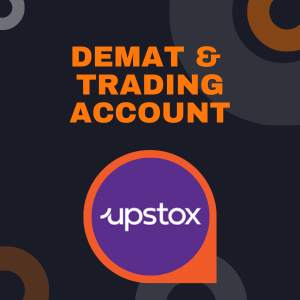Demat & Trading Account
Full form of Demat is Dematerialized Account. This account lets you electronically store financial products like shares, debentures, bonds, ETFs bought in the stock market. Simply put, a Demat account works like a bank locker that safely stores your shares.
Here are some key details regarding each:
Demat Account:
Purpose: A demat account is like a digital wallet to keep your securities, such as Stocks, Bonds, Mutual Funds and ETFs, in electronic form.
Benefits: It eliminates the need for physical share certificates and simplifies the process of buying, selling and transferring securities.
Custodian: This is usually maintained by a Depository Participant (DP), which can be a bank or a financial institution.
Opening Process: To open a Demat account, you will be required to provide proof of identity and address, PAN card and bank account details.
Charges: Demat account providers may charge annual maintenance charges and transaction charges.
Trading Account:
Purpose: A trading account is used to execute buy and sell orders for various financial instruments, primarily stocks, in the stock market.
Benefits: It provides access to stock exchanges, so you can place orders through brokers or online trading platforms.
Brokerage: To open a trading account you will need a stockbroker. They charge brokerage charges to facilitate your trading.
Opening process: You need to submit KYC documents, similar to those for a demat account, along with a passport size photograph.
Link to Demat: Generally, your trading account is linked to your Demat account for seamless transfer of shares bought or sold.
When investing in stocks, you will use your trading account to place orders, and the demat account will hold the securities you buy. It is essential to choose a reliable broker and understand the associated fees and charges before opening these accounts.
In the context of investing in the financial markets, especially the stock market, a demat account is necessary for several reasons:
Electronic Holding: Demat accounts allow investors to hold financial securities like stocks, bonds, mutual funds and exchange-traded funds (ETFs) in electronic or Dematerialized Form. This removes the need for physical share certificates, making the process more secure and convenient.
Security And Safety: Physical share certificates are vulnerable to loss, theft, damage and counterfeiting. In contrast, dematerialized holdings are stored electronically, making these risks significantly reduced.
Easy Transfer and Settlement: Transferring securities from one person to another becomes simple with demat accounts. It facilitates quick and secure settlement of trades during share market transactions.
Access to Investments: Many investment options, especially in the stock market, require investors to have a demat account. Without it, you may not be able to participate in an initial public offering (IPO), buy and sell stocks, or invest in mutual funds.
Portfolio Management: Demat accounts provide a consolidated view of an investor’s holdings, making it easy to track, manage and analyze their investment portfolio.
Paperless Transactions: Demat accounts are in line with the digital age, where most financial transactions occur electronically. They streamline the process of buying, selling, and managing investments while reducing paperwork.
Simplifies Corporate Actions: During corporate actions such as stock splits, mergers, or bonus issues, demat accounts simplify the process of updating securities or receiving cash payments.
Lending and Borrowing: Securities held in demat accounts can be used for lending and borrowing purposes, allowing investors to earn additional income through activities like stock lending.
In short, a Demat account is essential as it offers security, convenience and access to a wide range of investment opportunities in the modern financial landscape. It not only protects your investments but also facilitates efficient and paperless transactions in stock and financial markets.
So who offers Demat account?
NSDL and CDSL are SEBI registered entities providing demat services to stock brokers. Stock brokers then provide investors with access to a demat account.
NSDL and CDSL are technically known as depositories and they help in storing not only shares in dematerialized form but also other financial instruments like:
Equity Shares
Debentures
Bond
Exchange Traded Funds (ETFs)
Mutual Funds
Government Securities (GSecs)
Treasury Bills (T-Bills) etc.
Demat Account Benefits
The shares will be easily delivered to your demat account within 1 day of purchasing.
All risks associated with physical shares like loss of certificates, duplicate certificates etc. are eliminated.
Stamp duty etc. were levied on physical share certificates, which increased the transaction costs. But the entire paperwork is over with the demat account.
Shares can be easily transferred with minimal effort.
You can access your Demat account from your laptop, computer or mobile phone from anywhere, anytime.
In a demat account you can store shares, debentures, bonds, exchange traded funds (ETFs), mutual funds etc.
Now that you know everything about Demat accounts, you must be familiar with the types of Demat accounts.

